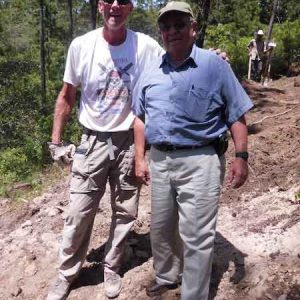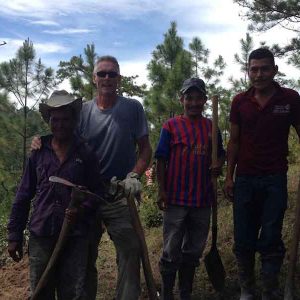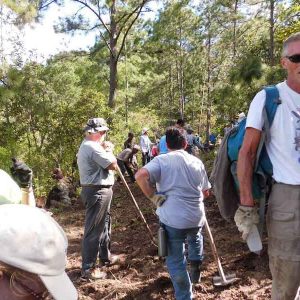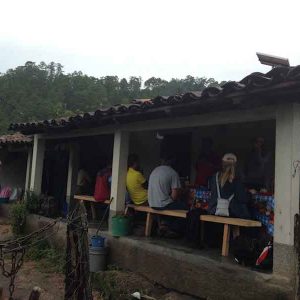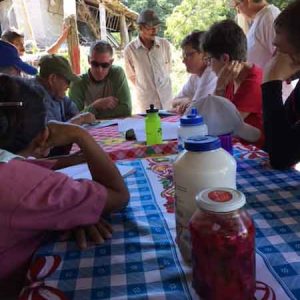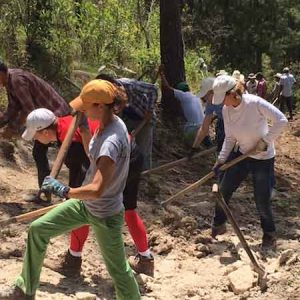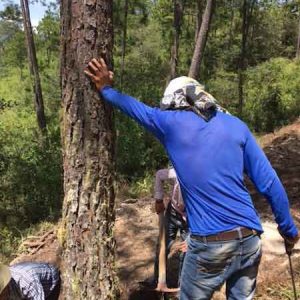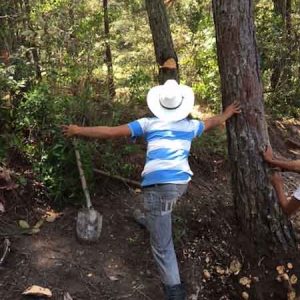Our Covenant with Creation – 1998
We believe that Clare and Francis, in their love and reverence for Jesus the Incarnate One, were led to experience all the created as holy and family, the dwelling place of Christ.
Awed by the generosity of the Most High, they were moved to praise.
They nourished this loving relationship by:
- serving all with reverence, especially those who are poor
- seeking always to strengthen communion
- mending broken relationships
- and restoring lost dignity.
With Clare and Francis, walking in the footsteps of Jesus, we believe in the Franciscan worldview:
- all life is gift
- all life is interrelated and has intrinsic value
- we are sisters and brothers with all in creation
- we are called to sustain one another
- we are called to seek the common good for all in creation.
This worldview calls us to on-going conversion:
from dominating, devaluing and possessing to serving, reverencing and sharing.
Whenever possible we will educate and make choices based on:
- intrinsic value of all life
- interconnectedness
- sisterhood/brotherhood with all creation
- serving, reverencing and sharing
- sustaining the whole ecological community
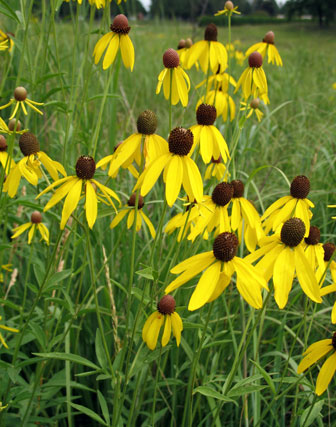
Land Ethic
Mission Statement of the Sisters of St. Francis
Rooted in the Gospel and the spirit of Francis and Clare, the Sisters of St. Francis live in right relationship with all creation.
In our personal, communal and public life, we commit ourselves to ongoing conversion as we
- Deepen our relationship with Mother Earth and Sister Water
- Stand with persons who are poor
- Make peace and practice nonviolence
This is who we are; this is what the global community can expect of us.
As Sisters of St. Francis of the Holy Family in Dubuque, Iowa, we recognize ourselves as part of a sacred family within the one Earth Community. Since 1879 we have shared a unique relationship with this parcel of land on the north end of Dubuque. This kinship calls us to cherish and care for the gift of land entrusted to us and is the source of our commitment to ‘live in right relationship with all creation.’
Informed and guided by the Rule of the Third Order Regular of St. Francis, Franciscan spirituality and discernment, our history and our own Covenant with Creation, we embrace and live a vision of Community of persons and ministries, of soil, water, plants, animals and buildings in this place we call home.
Our Land Ethic expresses our commitment to this web of relationships; we make our decisions about land and buildings and ministries guided by these principles:
Our decisions will honor and reflect:
- this relationship of mutuality within a Community of Care and strengthen the diversity and health of the whole community.
- the Gospel value of the Common Good of the Earth Community as a major factor.
- the Franciscan values of beauty, harmony and diversity, rather than solely utility and usefulness.
- the perspective of the Whole – the land and buildings as Community – rather than as separate parcels.
- our Franciscan spiritual heritage that sees creation as bearing God, communicating God and calling human beings to journey into God.
As Dubuque Franciscans following in the footsteps of St. Francis, we seek always to foster beauty, healing, life, simplicity, and joy. We “celebrate creation as a good gift of the good God.” (Michael W. Blastic, OFM)
He [Francis] commands the gardener to leave the edges of the garden undisturbed, so that in their season the green of herbs and the beauty of the flowers may proclaim the beautiful Father of all. He even orders that within the garden a smaller garden should be set aside for aromatic and flowering herbs so that those who see them may recall the memory of eternal savor. – Thomas of Celano, The Remembrance of the Desire of a Soul Early Documents, Vol II, 165
This is what the Earth Community can expect of us.
September 2016
Addendum
LAND ETHIC of the SISTERS OF ST. FRANCIS of the HOLY FAMILY
Land Ethic: expresses the relationship between people and nature and offers guidelines for making decisions about the land. Aldo Leopold introduced the term in his book The Sand County Almanac and enlarged it to express the land as a community of non-human elements of soils, water, places, animals and buildings. Our Land Ethic expresses the Franciscan vision that we are all kin, our Congregational history with the land on the North-end of Dubuque and our Covenant with Creation.
Franciscan Discernment: how Franciscans make decisions. Franciscan discernment is rooted in the experience of God’s Love and Goodness and Beauty; in our own Congregational history of this experience and our on-going conversion into Divine Love; it is the art of living and acting out of love. Franciscan discernment is counter-cultural: it is not strategic planning or a business model or the Ignatian model of discernment. Four key elements of Franciscan discernment:
* see the whole as the locus of beauty – NOT isolating one aspect
* let oneself be drawn by the heart – NOT turning life into a puzzle or a dilemma
* focus on praxis and action – NOT seeking an abstract solution
* follow the Spirit’s lead – NOT trying to ‘figure it out’ on one’s own
Earth Community: is sometimes referred to as the Community of Life. Humanity is part of a vast evolving universe. Earth, our home, is alive with a unique community of life and provides the conditions essential to life’s evolution. The resilience of the community of life and its well-being depend upon preserving a healthy biosphere with all its ecological systems, a rich variety of plants and animals, fertile soils, pure waters, and clean air. The spirit of human solidarity and kinship with all life is strengthened when we live with reverence for the mystery of being, gratitude for the gift of life, and humility regarding the human place in nature.
Community of Care: encompasses the interdependence of the members of the Earth Community. Each member not only contributes to the life of the whole, but receives from other members.
Relationship Between Earth Community and Community of Care: The Earth Community can be understood as all the individual members (human, non-human) that make up the community, each with specific things to contribute. The Community of Care speaks to the quality of the particular relationships between the members that form that community.
Perspective of the Whole: entails considering something in a way that takes into account ALL components/members of the Earth Community. It does not view buildings and land as separate, individual entities, unrelated to each other. The perspective or vision of the whole, moves from silo thinking of individual entities that occupy a common space, to seeing that all these entities form a Whole Community, and the possible implications for the entire community, not just one part.
Such a perspective/vision of the whole includes all components/members of the Earth Community. In our case, this includes: human and non-human; the history of our Congregation; the history of this place; our Franciscan heritage (values and spirituality); Franciscan model of discernment; our own Covenant with Creation; and the Gospel value of the Common Good. All these make up the Community of Dubuque Franciscans.
Discernment and resulting decisions take into account all the members of the Earth Community and not just one part as separate from the Whole. Each decision flows from the implication for the Whole. It is like a web, and pulling on one strand in the web, affects the rest of the web. Is it good for the whole community? Does it strengthen diversity and the health of the whole community? Does it flow from who we are, reflecting who we are? This perspective is not divided or disjoined.
Our Covenant with Creation: composed in 1998 and rooted in our Franciscan community’s lived experience of relating with creation and the insights gleaned from ongoing scientific study of the universe. The early sprouting of the seeds of our three commitment areas that will be articulated later, can easily be found in its concepts.
Common Good: is a “good” that is shared with and beneficial for all members of a given community. Here we are referring to decisions whose outcome will benefit all members of the Earth Community, and not just one or one segment. It recognizes the sacredness and intrinsic value of each member and our interdependence.
- Common Good – the definition from the Catholic Catechism:
- Sum total of all the social conditions that exist that allow individuals/groups to achieve their fulfillment.
- To uphold the Common Good – the needs and desires of individuals are allowed to happen WITHIN THE FRAMEWORK (parameters) of the WHOLE.
- Unless the Common Good is protected the group will cease to exist.
Beauty: In this Land Ethic we are not referring to a human-made/cultivated beauty or a human-defined beauty, but the “wild” beauty of creation that is deeply connected with our spirituality, with our relationship to the Creator. Beauty encompasses taking “a loving look at the real.” Mary Beth Ingham, CSJ in her presentation to the 2015 Franciscan Federation Conference spoke about an aesthetic moral vision from a Franciscan perspective, which sees creation as a world of beauty and not a place in need of “fixing,” nor a realm of the fallen, lesser beings. It is a GIFT and a place where we encounter the sacred. Creation is a place of conversion.
Creation as “bearing” God: This is an Incarnational concept that St. Francis knew intuitively, and Duns Scotus helped to articulate. In his article Franciscan Environmental Ethics: Imagining Creation as a Community of Care (Journal of the Society of Christian Ethics 31, 1 (2011): 143-160), Keith Werner, OFM, referring to Mary Beth Ingham’s work, Scotus for Dunces, states:
“Scotus asserts an integral, interdependent relationship between the Incarnation and creation, and the importance of creation in the divine plan…Creation was conceived by God before the beginning of the world to be capable of bearing Christ in incarnate form…The idea that all of material Creation was made for Christ means that for Christ to come, there had to be a Creation, and Creation had to be capable of receiving, understanding and freely responding to this manner of divine initiative…Because Creation was created to bear the Incarnation, every element, creature, and person gives material and outward expression of the Word of God. When Jesus came as the Incarnation of God there was a “perfect fit” because everything has been made to resemble Jesus Christ. Creation, according to the Franciscan tradition, is christoform, capable of bearing Christ, and the Incarnation is the fulfillment of Creation’s cosmic purpose. Thus, the fundamental purpose of creation is to bear Christ.” (– pg. 150)
Ministries that emerged from our relationship of the land
Throughout our history, we have had a total of about 250 acres under our care. This land has supported our mission and ministries – beginning with providing a home for orphans at Colette Hall. Through the years, various ministries emerged on some parcels of this land. This list is not exhaustive, yet gives a sense of the breadth of needs that have been and are being met through the generativity coming from our relationship with the land:
- Agricultural purposes
- Francis Convent (our first motherhouse)
- Francis Home which continued with Stonehill Franciscan Services
- Windsor Dentistry
- Calvary Cemetery
- Xavier Hospital and now Windsor Park
- Immaculate Conception Academy
- Early Learners Child Development Center
- Stoneridge
- Alverno Apartments
- Hills and Dales
- Shalom Spirituality Center
- Wellness on Davis
- Prairie Restoration
Over many years the work of various committees and groups has provided the foundation for our Land Ethic: Land and Buildings; Land Listeners; Care of the Earth; writers of the Covenant of Creation; Earth Community Opportunities; etc.

